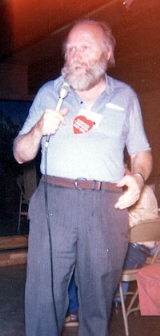
and its five sequel
s. The Dune saga
, set in the distant future and taking place over millennia, deals with themes such as human survival and evolution
, ecology
, and the intersection of religion
, politics
and power
.
I must not fear. Fear is the mind-killer. Fear is the little-death that brings total obliteration. I will face my fear. I will permit it to pass over me and through me. And when it has gone past I will turn the inner eye to see its path. Where the fear has gone there will be nothing. Only I will remain.![]()
Without coming fully awake, Rhin felt his presence beside her, experienced a primitive demand for his protective masculinity. She nestled against him, murmured, "its so hot. Doesn’t it ever cool off?"
![]()
"I only believe in certain kinds of hell," she said, and again she was looking at him, the green eyes steady."To each his own, eh?""You said it; I didn’t."
![]()
It wasn’t the kind of answer he'd expected — too subtly penetrating and leaving too much uncommitted. He reminded himself that it was difficult to control uncommitted people. Once a man had invested his energies, he could be twisted and turned at will... but if the man held back, conserved those energies...
![]()
A person cries out against life because it's lonely, and because life's broken off from whatever created it. But no matter how much you hate life, you love it, too. It's like a caldron boiling with everything you have to have — but very painful to the lips.
![]()
Is it possible this triviality is a code of some sort? the Brain wondered. But how could it be ... unless there's more to these emotional inconsequentials and this talk of a God than appears on the surface? The Brain had begun its career in logics as a pragmatic atheist. Now doubts began to creep into its computations, and it classified doubt as an emotion.
![]()
"A slave is one who must produce wealth for another," the Brain said. "There is only one true wealth in all the universe. I have given you some of it. I have given your father and your mate some of it. And your friends. This wealth is living time. Time. Are we slaves because we have given you more time to live?"
:A novel expanding four short stories, first published in serial form between May 1958 and February 1960![]()

